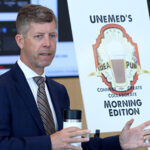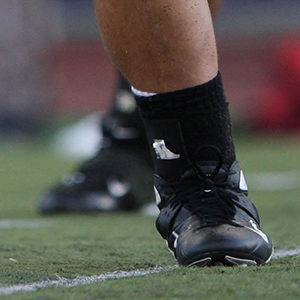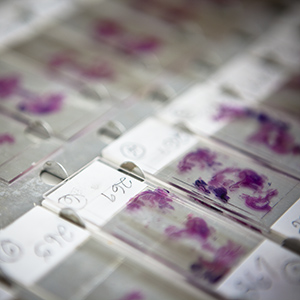What's a UNeMed?
UNeMed was initially created by the University of Nebraska’s Board of Regents to collect, protect, evaluate and commercialize the discoveries from UNMC’s innovative research. That mission was expanded to include the University of Nebraska at Omaha. Read more about us.
What is UNeMed’s relationship with UNMC and UNO?
UNeMed is was established as the technology transfer and commercialization leader for UNMC and UNO. On behalf of the University of Nebraska, UNeMed serves all UNMC/UNO faculty, students and staff on any matters related to intellectual property. Take a look at our full list services and resources.
Am I required to submit my invention to UNeMed?
Yes. As a University employee, you must comply with all University policies including Board of Regents Policy 4.4.2, which describes a researcher’s duty to disclose inventions. Per the Bayh-Dole Act, universities must protect or release back to the government all federally-funded inventions. Board of Regents Bylaw 3.10 states: “Every invention or discovery within the scope of University employment, or from the use of University resources, shall be solely owned by the University.”
What is UNeMed's level of expertise?
Vast. As of early 2018, UNeMed had more than 106 years of combined experience in technology transfer fields, which was only matched by its level of cumulative expertise. UNeMed staffers hold a combined 15 advanced degrees, nine at the doctorate level. Expert fields include several life sciences, law, business and communications. UNeMed also has on permanent staff three patent attorneys and one patent agent. Meet our experts here: Staff Directory
Where are you located?
Our offices are in the Omaha Catalyst building, just west of Saddle Creek Road. You can find a map and driving directions here.
Do you have a notary?
Yes, please contact Mindy Ware for all your notary needs.
Will UNeMed fund work in my lab to further develop an invention or a technology I submit?
No. UNeMed does not directly fund the development of a technology.
What does UNeMed want me to know?
We want you to know that we work for you and represent your best interests. We are your technology transfer resource on campus, here to assist in advancing your innovations, cultivating collaborations, exporting and importing biomedical resources, and protecting your inventions and discoveries. We want you to be conscious of what services we offer with an emphasis on protecting University inventions and managing agreements, such as material transfers, confidentiality and technology licenses. You should also know that it is very important that you tell us about your invention before publicly disclosing it to others in any way, including seminars, papers, posters, abstracts or grant applications.
What is technology transfer?
Technology transfer is the process of moving academic research from bench to bedside. Inventions, ideas, knowledge, skills and discoveries are first protected and then shared with potential commercial and public partners who can help bring those discoveries and innovation to the market where they can do the most good. Read more…
Why should I care about technology transfer?
Technology transfer activities protect and draw attention to your discoveries. They attract commercial support for your research. They safeguard your future research, and move your inventions into commercial use for public good. Read More…
How soon can I hear from you after I submit my invention?
You will receive confirmation from UNeMed within days of submitting your invention, which may include a request for a personal meeting to discuss your idea. We will then provide you with feedback following our evaluation within about 30 days.
What's a NIN?
We sometimes refer to our New Invention Notification form as a “NIN.” It’s our invention disclosure form, and an important part of our process. More information can be found on the Inventions page.
I have an idea, who do I talk to?
You can talk to any of our licensing staff. Give us a call at 402-559-2468, and we’ll find the best person to work with you. Or, if you’re looking for someone specific, their information can be found in our Staff Directory.
What’s the Assignment form for?
The Assignment is legally required to formally transfer all interest in the invention to the Board of Regents of the University of Nebraska. This document is required by Regents’ Policy 4.4.2. Not completing the Assignment is a failure to comply with this policy.
Do all inventors need to sign the same Assignment form?
No. Each inventor may sign a separate form.
Can I just send a copy of the signed Assignment form?
No. We require an original, signed and notarized document.
Why do I need to assign my invention?
Each invention by a UNMC employee resulting from performance of duties within the scope of University resources shall be solely owned by the University. Please refer to the Regents’ Policy 4.4.2.
Can I add an inventor after filing a patent?
We exert a lot of time and energy to ensure this doesn’t happen, but if it’s determined that an inventor should be added to a non-provisional patent application, that person may be added at the time the provisional application is converted into a non-provisional application. If an inventor is identified after filing the non-provisional application, we can petition a change be made in inventorship but the process is costly.
Who can be an inventor?
Anyone who contributes to the conception of an invention. People who provide moral or administrative support do not count. Read more about Inventorship in our blog.
What’s the difference between provisional and non-provisional patent application?
A provisional patent application is a simple and inexpensive application to essentially give an inventor the earliest filing date possible. One year after filing, the provision must be abandoned, or a non-provisional application—a much more detailed and complete document—must be filed. Read more in our Patent Primer.
We filed a patent application, so that means I have a patent, right?
No. Applications must be reviewed and approved by the United States Patent and Trademark Office before they issue a patent. This process can take anywhere from five to seven years. Read more in our Patent Primer.
Can you help me with my SBIR/STTR submission?
Yes. Our business development manager can help review the application or send you to the right person to review it.
Do I get paid if my invention is licensed?
Yes. Board of Regents Policy 4.4.2 requires the University to distribute one-third of net proceeds received from a profitable invention to the inventor(s).
If a technology is licensed, what happens to the incoming revenue?
All revenue received from a licensed technology follows parameters set by Board of Regents policy 4.4.2. First, all University costs associated with the research and development of the innovations, along with additional costs related to supporting, protecting and marketing the technology are reimbursed prior to distribution. Then, inventors receive one third of the remaining revenue. The remainder is then proportionally distributed among relevant colleges, departments, units and the Chancellor’s office in accordance with UNMC’s Royalty Distribution Policy.
What happens during the evaluation of an invention?
Evaluations determine the patentability and marketability of an invention. Patentable and marketable inventions will proceed to our commercialization process. Additional information can be found on the Inventions page.
What are the possible outcomes from an invention evaluation?
The outcome depends on the marketability and patentability of the invention. We choose to move immediately to protect the invention, or we might request for additional research from inventors to further strengthen an invention. Or, we may find that someone else, somewhere else, has already patented the idea or discovery—but we might be able suggest a new line approach to a new or related project where you can break new ground. Additional information can be found on the Inventions page.
What is considered a public disclosure?
A public disclosure occurs when you share intricate details of an invention with individuals who are not held under confidentiality. Examples of public disclosures can include, but are not limited to: seminars, papers, presentations, posters, abstracts and grants. Additional information can be found on our Public Disclosures post. UNeMed assists inventors by instituting a Confidential Disclosure Agreement (CDA) to maintain proper protection.
Who pays for patents?
Through the Board of Regents, UNeMed maintains a limited annual budget designated for costs incurred protecting the intellectual property of University inventions. UNeMed seeks industry collaboration to support ongoing patent costs associated with a licensed invention.
What is required of me as an inventor?
Upon receipt of the invention, UNeMed staff may request a meeting to discuss your invention. As a University of Nebraska inventor you are required to provide UNeMed with any updates pertaining to your invention, including new data and funding. If a company is interested in your technology, UNeMed staff may request your presence at a meeting with the company to discuss technology development.
Can students be inventors?
Who does the evaluation of my invention?
A member of UNeMed’s licensing staff will evaluate the technology and present findings to the Strategic Technology Assessment Committee for further discussion.
Who do I speak with when I want to export materials?
To export materials outside of the U.S., you will need to complete an export control form so we can set up a Material Transfer Agreement. UNeMed’s contracts specialist will help you with the process and can coordinate with the export control group to initiate the process. You may also contact the UNMC Export Control Officer (402-559-4518) to obtain an export control form. Read more on our MTA page.
What should I consider when reviewing a consulting agreement from an outside entity?
First, it’s important to determine whether or not the consulting work is within the scope of your work at the University. If it’s outside the scope, it’s important to make sure that none of the terms of the agreement conflict with those in your employment contract with the University.
Although UNeMed or UNMC’s Sponsored Programs Administration can provide some general direction as to when there may potentially be a conflict, we as UNMC personnel cannot act as your personal attorney for non-University matters. Therefore, it may be in your best interests to have a private attorney review consulting agreements.
Intellectual Property | Patents | Forms & Policies | Funding | FAQs
UNMC Research | UNO Research | Nano Production | UNMC Core Facilities | UNL Core Facilities







